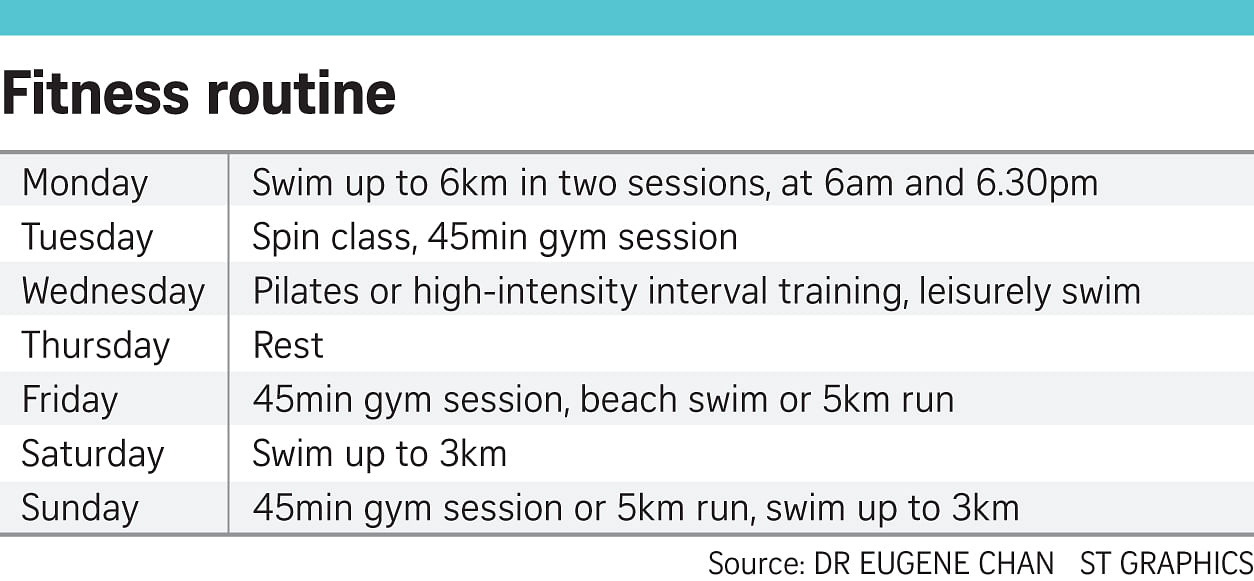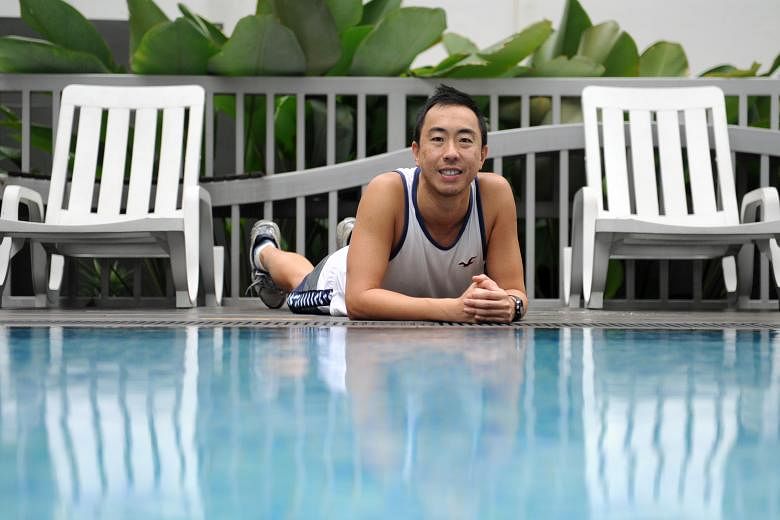Q Have you always had such an intense routine?
A No, I picked up competitive swimming again only about three years ago.
Before that, I did some running, swam occasionally and went to the gym, but it was nothing too serious.
I was rather surprised that after so many years, I still find swimming therapeutic and an absolute joy. It keeps me balanced, helps to maintain my fitness and, I believe, prolongs my working life as well.
Q What made you pick up competitive swimming at 40?
A Through social media, I reconnected with several teammates who I used to train and swim with when we were in secondary school.

We formed an ad hoc team called the OBG (Oldies But Goodies) and began training regularly to keep fit and healthy. As I reside in Sydney, Australia, I try to meet them about once a month when I return to Singapore. Otherwise, I train mostly on my own in Sydney.
-
Bio Box
-
DR EUGENE CHAN
AGE: 43
HEIGHT: 1.78m
WEIGHT: 68kg
The orthodontist picked up competitive swimming again three years ago and is now in the pool three to five times a week.
In addition, he goes for gym workouts and exercise classes.
He learnt how to swim when he was around three. He swam competitively in primary school and won his first gold medal in Primary 2.
The intense swim training lasted until he enlisted for national service, when he picked up water polo.
"At one stage, I was training close to eight to nine sessions per week," said Dr Chan, who is single.
"During those days, training was solely swimming. There wasn't a lot of cross training like weights and gym sessions like nowadays."
He picked up life-saving skills in secondary school and represented Singapore at the Asia-Pacific Lifesaving Championships when he was in Secondary 4.
"When I was studying at the National University of Singapore, I was involved once again in competitive water polo, swimming, as well as life-saving. It was pretty intense."
He runs a clinic in Sydney, Australia, and maintains a part-time orthodontic practice in Singapore, as well as lectures once a month at the University of Sydney.
He has a sister. His parents are retired.
Getting back into a strict training routine isn't as painful or as tough as most people would think.
It is more about building a fitness routine and setting goals.
Q What competitions have you participated in in the past three years?
A I have raced in the Hong Kong Masters, Japan Masters, Singapore Masters and the World Masters Championships in Montreal, Canada. I also participated with a team and did the swim leg for the Ironman 70.3 race held in Bintan, Indonesia, this year. It was an open-water, 1.9km swim and I finished second in my division.
Q How important is it for you to keep up with your fitness routine?
A I would feel uncomfortable if I were to miss my workout for a day. But it is not as if I have not missed any. As I train mostly on my own, it is not easy to maintain discipline. On days with bad weather or cold winter mornings, I would feel lazy.
I also have previous injuries - I broke both ankles playing volleyball in junior college and dislocated my left knee while skiing a few years back - so I know my limits and adjust my training accordingly. I am not as "hard core" as I would like to be.
Q Has there ever been a time when you were not fit and fab?
A I think it was the period when I was studying for my PhD in the Netherlands about 10 years ago.
I didn't have time to join a gym and the weather was too cold to allow for much outdoor activity.
In addition, I was eating quite a bit of pre-prepared or processed food. I put on weight and was about 74kg then.
Q What is your diet like?
A I have breakfast and a large lunch. I eat very little for dinner and that meal usually does not include any carbohydrates. I eat quite a lot of eggs.
To give you an idea, my breakfast could comprise two eggs and a cup of tea. I would have cereal with soya milk for my morning snack.
Lunch may be brown rice with a tomato salad, tuna and one egg.
I then have a cereal or protein bar before my evening workout.
Dinner is a banana protein shake with soya milk, some greens and a piece of grilled meat or fish with two eggs.
Q What are your indulgences?
A I love noodles and a good burger!
Q What are the three most important things in your life?
A My family, health and good sleep.
Q What are your must-dos before and after a race or a training session?
A I make sure I eat healthily and sleep well before each race.
I rehydrate and fill up on my proteins after each workout.
Q What is the most extreme thing you have done in the name of fitness?
A I did skydiving in Sydney but that was more for the adrenalin rush!
Q How extensive is your collection of sports-related paraphernalia at home?
A I still have most of my medals that I won during my primary school days. My most prized possession is probably my first gold medal from a swim meet in 1980.
Q Would you go for plastic surgery?
A No. It's better to stay healthy, accept what and who we are and age gracefully.
Q Do you think you're sexy?
A No, but perhaps my voice is.

